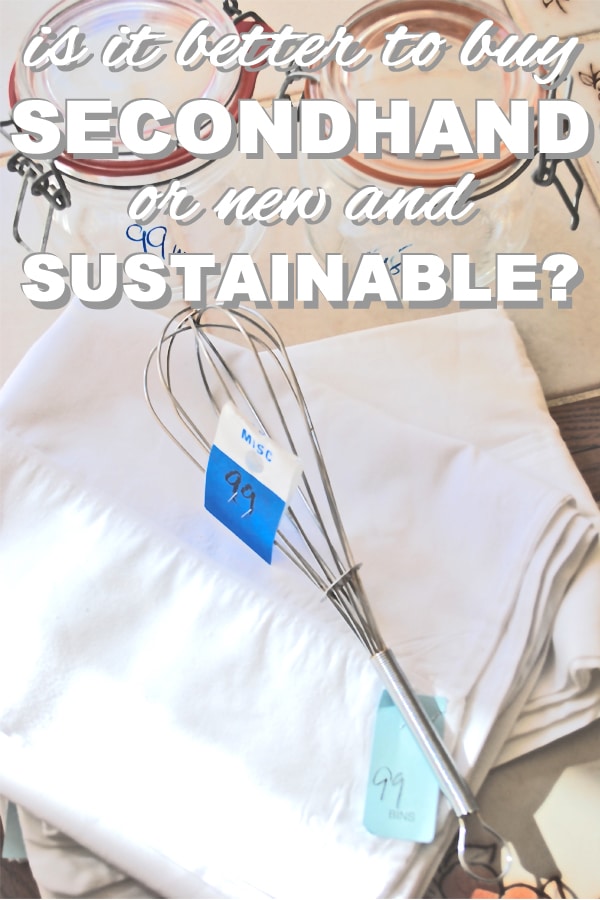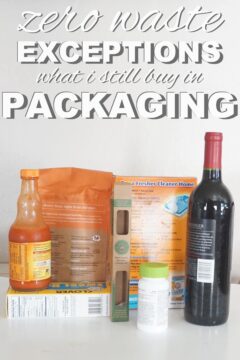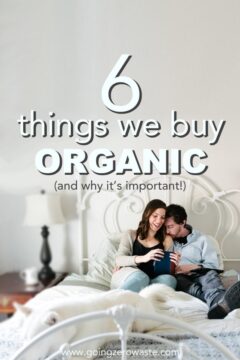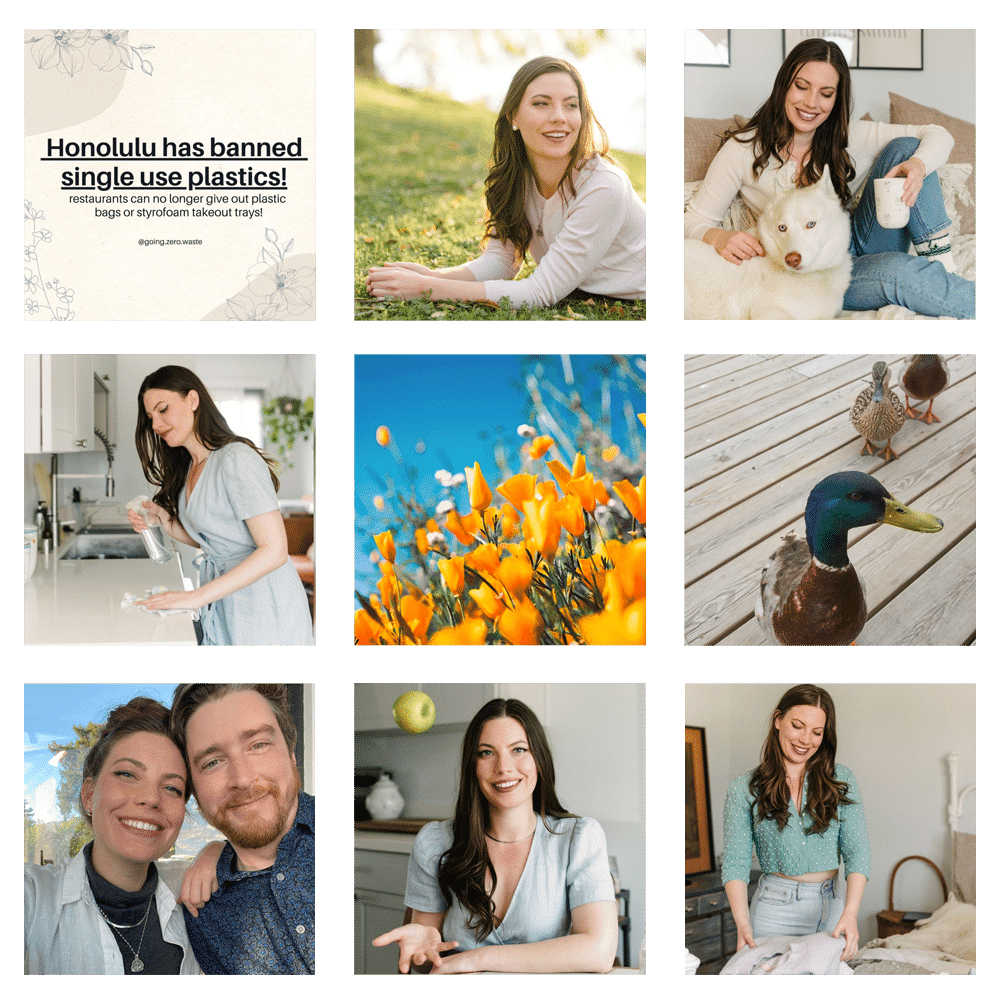Is it better to buy second hand or new and sustainable?
Zero Waste Lifestyle
April 5, 2016 | Kathryn Kellogg
Last Updated on January 23, 2024
It’s a real pickle y’all. I often find myself torn between supporting a local, sustainable business or buying secondhand. 99% of the time my decision is driven by cost.
I’m young. I live in the bay. I’m an actor/work at a print shop. My salary is…. how do you say – petite?
I’m not complaining. I am exceedingly blessed and very fortunate. But, I find value in options both new and used.

I started thinking about this when I fell in LOVE with a dress in the window of a local boutique.
After chatting with the business owner, all of her dresses are made in America or fair trade and sustainable.
I went back later in the day and bought a new piece of clothing. I haven’t done that in a very, very long time.
The dress is made exceedingly well, can easily be repaired if something is wrong, and I supported a local business! But, the whole time I felt a little bit of guilt. I haven’t bought anything new in so long.
I want to buy second hand because it’s great for the environment and great for my wallet.
But, I also want to support my local, sustainable businesses. I want to invest in the future of my community. So, let’s chat the pros and cons of buying used vs. buying new.
buying used:
We don’t need more stuff: There’s enough stuff in the world to last us years. And, New items are being added to the second hand market every day.
Justin and I just donated four boxes worth of clothing and housewares. We only have 800 sq. ft. – where did it all come from!? Most of these items are unused and will hopefully make a new owner very happy.
Waste diversion: By donating or buying second hand, we’re diverting waste.
We are preventing another item from entering a landfill. Just because we’re finished with something doesn’t mean that it’s finished.
New life: When you buy second hand, you’re giving an item new life.
Hopefully you’ve thought carefully about your purchase, and will repair, clean, maintain, love, and properly care for the new item in your life. I buy a lot of my shoes second hand.
When they look tired, I take them to the cobbler ensuring we’ll have a long, happy life together.
Longevity: Second hand gives us a window into the past.
It’s amazing to me how many products still exist from the 50’s & 60’s. I have crates, dust pans, bowls, pots, pans, and the list goes on.
These products are meant to stand the test of time. They were created to be cared for and repaired. So, many products made today can’t be repaired.
Saving money: My favorite reason. I definitely get a high from buying a $250 dress for $20. Or a Le Creuset $250 dutch oven for $40.
buying new:
Supporting local businesses: I love supporting my local businesses.
I want to invest my money in a sustainable future. A local sustainable future. I think it’s so important that we support our local communities.
We have the ability to provide jobs and create community well being.
Going under: If we all stopped buying goods, or if we all only shopped second hand we would see our local businesses suffer the most.
Now, this is not a call for purchasing lots of new items, this is not a call for mass consumerism. This is a call to be a conscious consumer to buy products you know the history of, to buy products you will repair and mend, to buy products you will cherish.
Supporting sustainable practices: It can be very difficult to know the practices of a mass corporation. You’re not typically talking to a real person.
With a small and local business you get to know the exact process. You know everyone who had a hand in making your item.
Knowing what’s in your home: I am a big believer in buying organic. I’m not going overboard and throwing everything out of my house, but I would really like for my bedding and wash cloths to be.
What I have now is fine. When it wears out, instead of buying second hand, I would like to buy new so I know the fabric I consistently rub all over my body is non-toxic.
Resources: It takes a lot of resources and energy to produce a new item.
Hard to find: Sometimes you can scour thrift stores for weeks looking for something you need with no luck. Clothing basics anyone?
I’m sure the white tank top I’ve had for the past four years will need replacing soon.
It’s not so much white anymore…. when the time comes, I will probably turn to a sustainable company and will buy a tank top that will last.
I think that each decision should be handled on a case by case basis. But, I don’t think there’s a problem occasionally splurging on a sustainable piece for your wardrobe or a pot or pan that will last a lifetime. What do you think?
Are you strictly second hand? Or would you support a local/sustainable business?














Great post. I’m all for buying the occasional new item if it’s sustainable and is something you love and will take care of. Personally, I can’t commit to being that attentive with most things I buy and just go the second-hand route most of the time.
That said, I need to replace my roof soon, which definitely won’t be second-hand and looking around I’m not sure any of the options are really sustainable, so in that case I’m looking for the option that will last longest with the least maintenance (that I can also afford).
I totally understand. I sometimes slack in the repair department. But, I enjoy needle point, so I always make my way to it… eventually. Yes! Home improvement is so difficult!! But, it’s important to maintain your house. Hopefully you find a good solution!
I definitely agree. I think buying secondhand is important, because as you say, we have a lot of of usable goods in the world that could meet most of our needs. However, if we want to local economies to thrive and build up our communities, we need to help them. When you buy local and sustainable (and things that last = sustainable), you’re investing in the future of a green-minded community.
Yes, I’m all about spreading the love! Everything in moderation right? A little second hand, a little new…. mix it all together for a happy, sustainable future.
I think about this ALL THE TIME. I definitely think it’s on a case by case basis. Like you said, you want the fabrics that you surround yourself with to be healthy–I am really making a conscious effort to buy natural and organic. So I’m constantly wavering between American-made small businesses and secondhand shops. I’ve just started looking for quality > quantity now that I have a full-time job. For basics, like camisoles and plain tee shirts I just buy new. For all else, I visit Crossroads Trading Co. because they are honestly my favorite <3
Shoes I will buy new–until natural footwear catches on and I can find it in the secondhand market. Stylish shoes that both have a wide toe box and zero-drop heel (in a size 5.5!) are hard to come by, so I plan on having them custom made unless I find a better option first. It’s a personal lifestyle choice to wear ‘minimalist shoes’ to promote foot health. These niche markets are hard to find (if you don’t want to look like you’re coming from Burning Man 24/7).
Appliances, furniture, jars, and infinite number of items definitely have a place secondhand. I wonder how I’ll fare once I finally get a place of my own!
I think as long as we have patience for each other and support one another to inch towards secondhand, then everything is cool. If people buy new reusable bags because they are excited about changing their life towards zero-waste practice then we should support them. Regardless if people buy new or used, if they go into with a ‘quality’ mindset and the intention to take care of that said item, then it will still divert trash for many years to come.
I LOVED this post 🙂
Excellent points! (As always. 🙂 Yeah, it’s really hard to avoid synthetics at the thrift store. I’ll definitely have to check out cross roads. Custom shoes. Those should last your entire life. You could always get the repaired or resoled. That’s something I love about investment pieces. They’ll last for eternity!!
I two decide on a piece by piece bases. My husband of five years, at first had a hard time with my buying second hand. He felt like he wasn’t taking care of me(sweet) but he understands my mind set now?
That’s so cute! Yeah, my mom really struggled with the idea of second hand. But, now that she’s found several practically new pieces or even pieces with the tags still on from her favorite designers at a 70-90% discount…. she’s hooked. lol.
I totally agree that there needs to be some balance. I enjoy buying secondhand for myself and my immediate family, but when it comes to gifts for friends and relatives, I often seek sustainable/local options. Consumables and services are also a great way to support sustainable/local. And for as many people as there are living in larger cities with a great secondhand/market, the rest of the population in more suburban/rural areas are more likely to seek out sustainable brands online.
Interesting. I don’t live in SF proper and while they might have a better selection – the small towns in AR were the best! Maybe not for clothing, but pretty much everything else. No one has a mason jar shelf like the deep south. But, their in town sustainable options are probably non-existent.
I live in AR and was curious which small towns you were referencing in your note above? I try to shop local and stay away from big box stores. I love our Farmer’s Markets we have here. Fresh fruit and veggies year round!
We are balanced 😉 Great article ! The important point is to feel free and not guilty by one or another decision.
Supporting local sustainable business (by crownfunding for example) makes us happy too. We decide where our money goes 😉
Very true! A little bit of moderation is always nice.
I’m so glad you outlined this! I often wonder about this myself. This felt like a conversation with you where we were chatting about the pros and cons – thanks, friend!
I love pros and cons lists!
Thanks for writing this article! I really struggle with this kind of decision and the guilt of buying new (after shopping used kids clothes, I have come to believe that most girls clothes quality is almost disposable and not designed for movement and play). I also often struggle with deciding to replace a home item with something more sustainable/efficient, or just keep what I have. Great list!
Thanks! I’m glad it helped! No need to feel guilty about making the best decision for you and your family.
Often buying used is also supporting local small businesses. Just like any other purchase we make, doing a bit of research will lead you to a second hand shop that is small and local. A win for everyone!
I so needed this post!
I always buy my clothes second hand, but for my birthday I decided to gift me a lovely dress from a local boutique. I was feeling guilty about it, but you made me change my mind. Now I can hope my buying will help that boutique survive between H&M and Zara all around.
please check out swap.com ….
Where I live i Sweden, in a really small town, we have a ”waste dump” called Återvinningsgårdem ( badly translated ~ reusementfarm). At Återvinningsgården you leave all your sorted waste in different big containers. All the things you want to get rid of, that is still working/whole you put in a barn-like building called Återvinningstältet ( the namn means reusement tent, it used to be at huge tent)
So, to my point. When i visit Återvinningsgården with my family every other Saturday, I allways take a peek in the Återvinningstältet to see if I can find some of the things I got on my ”need to get list”. So far this summer I found myselfe a new hairdryer, a beautiful porselin jar perfekt for my homemade lemonade and a big cast iron pan. And the best- its all for free! While wisiting the Återvinningstältet i left a small kitchentable and a small cast iron pan. Things that maby a smaller family can use. My girls left a box of toys and stuffed anilmals.
But. Before I leave things at Återvinningstältet i allways try to sell it cheap at the lokal Facebook ”by & sell-group” and if it got sold and i get some SEK for it I might allso visit our lokal Red Cross shop. That way I can buy what I need and at the same time donate the money…
All the girls clothes goes directly to the Red Cross, and parts of my clothing to. Nothing goes to landfill!
Just utside my small part of the world we have a ”farm shop” lokated in an old converted barn building that sells eco-friendly, sustainable, quality items. Thats where we buy most of our ”new things”. They also have a little ”farmers market” in the old tiny recidence building from the 1700’s where we can order our meat, buy egg and our greens.
So. I buy new tings and I buy old things. I donate, re-sell and swap. It works for us. I support The lokal farmers and aspecially I make shore not to produce lots of garbage an especially NO landfill!
Thank you for having a terrific blog!